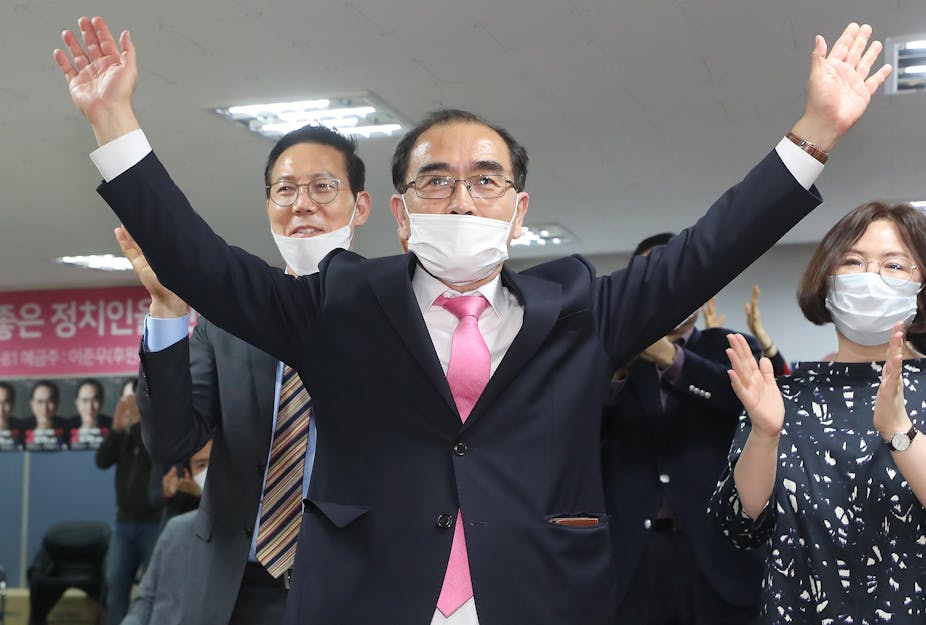Two North Korean defectors, Thae Yong-ho and Ji Seong-ho, will be sworn in as members of South Korea’s National Assembly on May 30 after winning seats in the country’s April general election. Yet the road from election to parliament has not been smooth, thanks to the ongoing challenges faced by North Korean defectors in winning the trust of South Korean society.
Thae and Ji aren’t the first North Korean defectors to be elected to parliament. Cho Myung-chul held a proportional representative seat from 2012-16. But suspicion of defectors remains an ongoing legacy of the national security threat North Korea is seen to pose to the south.
The April general election went ahead even as South Korea was experiencing a modest number of new cases of COVID-19. Parties aligned with incumbent progressive President Moon Jae-in won strong support, affirming the success of his government’s efforts to control the outbreak.
The North Korean refugees were elected as members of two conservative opposition sister parties – Thae for the United Future Party (UFP) and Ji for the Future Korea Party (FKP). These parties, which merged under the UFP banner on May 29, oppose Moon’s “soft” approach to North Korea that aims to foster dialogue and engagement.
Controversial figures
Both men have been critics of Moon’s policies, expressing scepticism about progress towards denuclearisation or a formal inter-Korean peace agreement. They also question the utility of restoring inter-Korean cooperation to the levels made possible under South Korea’s pro-engagement Sunshine Policy of the 2000s.
Thae is known for his high-profile defection from the North Korean embassy in London, where he served as the deputy ambassador between 2006 and 2016. A confident English speaker, he has widely discussed the inner workings of the regime since his escape.
While Thae epitomises the privilege of the North Korean elite, along with the political savviness that comes with such experience, Ji comes from a much less distinguished and arguably more traumatic background. He left North Korea in 2006 in a harrowing escape, made all the more challenging by the fact that he is missing one leg and an arm after an accident in North Korea.
After arriving in South Korea, he founded a non-governmental organisation, Now Action and Unity for NK Human Rights, and has advocated widely on human rights and other issues regarding North Korea, including as a guest of President Donald Trump at the 2018 US State of the Union address.

Yet the election of these two candidates doesn’t necessarily mark a major improvement in South Korean society’s acceptance of North Korean defectors. Some commentators argued that Thae’s election was not a sign of radical inclusiveness. The Gangnam-A constituency to which he was elected outright is home to many of the traditionally conservative, affluent elite who would have voted for whomever the UFP nominated as their candidate.
Ji was elected on the basis of proportional representation and doesn’t have a specific constituency. But his election was fairly certain as long as the FKP secured enough votes overall to allocate him a seat. And given that the number of North Korean defectors who have come to South Korea now exceeds 33,000, it’s unsurprising the party deemed it worthwhile to designate a seat for a North Korean defector candidate.
Kim Jong-un’s disappearance
Nevertheless, the period since the election of the two men has been a rocky one, thanks to recent events in North Korea. Between April 12 and May 1, North Korean leader, Kim Jong-un, was conspicuously absent from the public eye, leading to speculation that he was ill or had even died.
Ji said in a media interview on April 30 that he was “99% certain” that Kim was dead. Thae, meanwhile, told reporters that while Kim’s personal health is always the state’s most closely guarded secret, he suspected Kim was unwell.
After Kim reappeared apparently alive and well on May 1, Thae and Ji duly apologised. Thae said he had been “feeling the impact of his words keenly” and Ji likewise claimed to feel deeply the “weight of his post”.
But the progressive ruling party expressed anger towards them for allegedly sowing seeds of uncertainty with “unconfirmed information” and demanded their apologies. Some also called for Thae and Ji’s exclusion from any parliamentary committees dealing with information crucial to South Korea’s national security.
Ongoing stigma
The stigmatisation of these two democratically elected officials can be attributed to party politics. But it also points to the persisting distrust in South Korean society towards North Korean defectors, despite their best efforts to carve out a new existence in a society very different from the one they left.
Such sentiment will not easily be overturned while North Korea continues to be viewed as a threat to global peace and security, and while South Korean politics remains deeply divided over its approach to the North.
Unfortunately, fighting the stigma associated with where they come from will likely be the prevailing focus of Thae’s and Ji’s time in office. Yet if they can last the distance, especially under Moon’s progressive government, they will have gone some way to proving to society that they deserve a place in South Korea’s democracy, while perhaps also chipping away at the daily prejudice faced by defectors.

